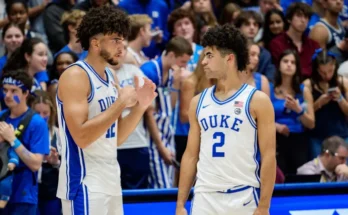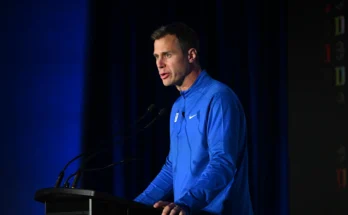During the spring portal window, Arizona football survived. A plus for a program that desperately needs a victory
In the chaotic modern landscape of college football, surviving the spring transfer portal window without a talent exodus qualifies as a win—especially for programs in transition. For the Arizona Wildcats, this spring brought stability in a time when anything but was expected. And while the wins on the field are still to come, surviving the portal may be the most important development yet under new head coach Brent Brennan.
It’s no secret that Arizona football has hovered in mediocrity—or worse—for much of the past two decades. Flashes of potential have come and gone, mostly swallowed by coaching turnover, instability at quarterback, and a lack of sustained success in recruiting. But the 2023 season, under then-head coach Jedd Fisch, offered a spark. The Wildcats went 10-3 and captured a win in the Alamo Bowl over Oklahoma, their best season in a decade. For once, the program felt like it was on solid ground.
And then came the seismic shift: Fisch was hired away by Washington in January 2024. In his wake, the transfer portal loomed large. Would Arizona’s rising stars follow him out the door? Would the foundation he built crumble in the face of modern roster fluidity?
When Brent Brennan took over in January, his challenge wasn’t to sign a top-10 recruiting class. His job was to hold the roster together. Brennan arrived in Tucson with the reputation of a strong culture builder from San Jose State, where he had turned a perennial also-ran into a consistent winner. But the stakes were higher at Arizona. This wasn’t about building from scratch—it was about keeping a potential top-25 team intact.
Brennan moved quickly to stabilize the situation. He retained key members of the previous coaching staff and emphasized continuity to the players. His pitch was clear: “This isn’t a rebuild. This is our chance to finish what you started.”
The players responded. Quarterback Noah Fifita—arguably the most critical domino—committed to staying. Wide receiver Tetairoa McMillan, a projected first-round NFL Draft pick in 2025, also resisted overtures from high-powered programs. Add in linebacker Jacob Manu, cornerback Tacario Davis, and several others, and Arizona retained the core of its 10-win squad.
In an era where star players bolt at the first sign of uncertainty, that kind of retention is rare. Brennan didn’t just avoid disaster—he solidified a team that now believes it can win the new Big 12.
To say Arizona “survived” the portal implies they endured losses. That’s true—but the scale matters. The Wildcats had a handful of spring departures, but none that crippled the program.
Among the notable names to enter the portal were depth players or those seeking more playing time elsewhere. No key starter defected. The lack of a talent drain wasn’t a given, especially considering the financial incentives of NIL and the lure of larger programs.
Arizona’s collective NIL efforts, spearheaded by the Friends of Wilbur and Wilma collective, deserve credit. The program was able to offer competitive packages to keep its core intact—not necessarily matching the offers from SEC or Big Ten schools, but enough to demonstrate commitment. In return, the players showed loyalty.
In many ways, Arizona’s spring portal survival wasn’t just about keeping talent—it was about keeping belief.
The 2024 season will mark Arizona’s debut in the revamped Big 12, a league with no Texas or Oklahoma and a wide-open championship race. Programs like Utah, Kansas State, and Oklahoma State may enter as favorites, but the gap between contenders and the middle tier has shrunk. Arizona, with its roster intact, has a legitimate shot to win the conference in Year One.
Fifita will be one of the most experienced and productive quarterbacks in the conference. McMillan and Kevin Green Jr. form a dangerous receiving duo. The offensive line returns three starters, and the defense is loaded with veteran leadership. Continuity is rare in this era—but Arizona has it.
More importantly, Brennan has buy-in. In team meetings and spring practices, he’s been able to coach without constant questions about who’s staying or leaving. That clarity has allowed the Wildcats to focus on football. Scheme installation, culture building, and leadership development—all the ingredients for success—have taken priority.
Had Arizona lost Fifita, McMillan, or Manu, the narrative would have shifted dramatically. Instead of discussing Big 12 contention, fans would be bracing for a rebuild. Instead of preseason rankings, the program would be fielding existential questions about sustainability.
Arizona football has long been defined by turnover. Since the turn of the century, the Wildcats have cycled through five full-time head coaches, multiple quarterback controversies, and sporadic recruiting classes. Even brief moments of success—like the 2014 Fiesta Bowl run under Rich Rodriguez—have been followed by regression.
That context makes the current moment feel different.
Stability breeds confidence. Players aren’t looking over their shoulders. Coaches aren’t scrambling to fill holes. Fans aren’t dreading the next Twitter bombshell.
The spring portal window represented a final test of Arizona’s resolve. Had stars left, it might have shattered the program’s momentum. Instead, Arizona walks into summer workouts with belief, cohesion, and continuity.
Those traits don’t guarantee wins, but they are prerequisites for competing at a high level.
Brennan isn’t trying to reinvent Arizona football. His blueprint is simple: build relationships, emphasize development, and recruit with purpose. He understands the realities of the modern game—particularly how NIL and the transfer portal have changed roster management. But he also knows that culture still matters.
His messaging since day one has been about unity. That’s why he prioritized one-on-one meetings with players. That’s why he leaned on returning leaders like Fifita and Manu to steady the locker room. That’s why he retained assistant coaches who had built trust with the roster.
For now, Brennan’s first major victory isn’t on the field. It’s in the locker room.
Arizona still has work to do. Depth at offensive tackle remains a concern. Defensive line rotation is thin. But those are standard offseason problems—not existential ones. The core is intact. The vision is clear.
With the spring portal window now closed, Brennan and his staff turn their attention to summer conditioning and preseason prep. Arizona’s schedule offers immediate challenges, including nonconference matchups that could shape national perception.
But for the first time in a long time, the Wildcats enter a season with real expectations. They aren’t just hoping to be competitive—they expect to contend.
That starts with quarterback play, and Fifita gives Arizona a major edge. The sophomore threw for 2,869 yards and 25 touchdowns last season while completing 72% of his passes. His return provides continuity and credibility. Around him, McMillan—who posted 1,402 receiving yards and 10 touchdowns—will be the top target, with Green, Montana Lemonious-Craig, and tight end Keyan Burnett offering support.
Defensively, Arizona’s scheme under Johnny Nansen is aggressive and fast. With Manu back to anchor the middle and Davis providing lockdown ability on the perimeter, the Wildcats may field one of the better units in the conference.
All of it is possible because the roster stayed intact.
To say Arizona “desperately needs a win” is to understate the emotional weight the fanbase carries. The 10-win season in 2023 was cathartic—but fragile. The departure of Fisch felt like a gut punch, another “one step forward, two steps back” moment.
But then something unusual happened: the program held firm.
In a sport where roster chaos is the norm, Arizona showed resilience. That’s a win—maybe the most important one this year.
If the Wildcats compete for a Big 12 title in 2024, we’ll look back at this spring portal window as the turning point. If Brennan succeeds in building a long-term contender in Tucson, it will be because he kept the foundation strong in his first 100 days.
For now, Arizona football isn’t just surviving. It’s building. Quietly. Purposefully.
And that, in today’s college football world, might be the most impressive victory of all.



